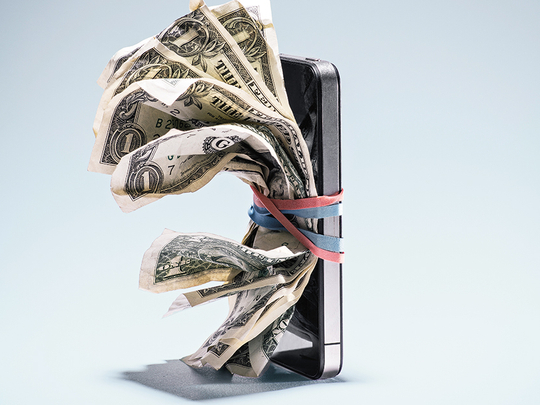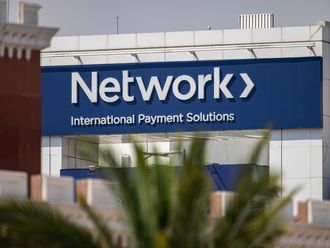
In a future smart city overflowing with sensors, scanners and digital solutions, the one thing that will be out of place is good old cash. In fact, even traditional credit and debit cards would look archaic. “Credit cards in the future may not be cards at all, we may see them evolve to newer form factors embedded in a smartphone or even as wearables,” says Faisal Aqil, Deputy CEO — Consumer Wealth Management, Emirates Islamic. “This scenario is closer than you think.”
He notes banks are already moving to payment solutions that use near-field communication (NFC) — for example, mobile wallets such as Apple Pay and Samsung Pay — and this will soon morph to watches and fitness devices.
Tech research firm Gartner estimates that by 2017, the global market for mobile payments will be worth $720 billion (Dh2.6 trillion), up from $235 billion in 2014.
Raghu Malhotra, President, Middle East and North Africa — MasterCard, agrees a global shift in payments is well under way, as physical and digital commerce converge, especially in tech savvy regions like the UAE. According to a recent MasterCard study, 83 per cent of UAE residents had made a purchase online in a period of three months, and four out of five respondents said they were satisfied with the process. Meanwhile, 72 per cent of the respondents in the Middle East, who were aware or slightly familiar with digital wallets, responded positively towards using the technology in the first 12 months of it being available in their market.
With the wider move towards to a smart economy, this is a “very exciting time” for the payments sector in the UAE, says Bhairav Trivedi, CEO of Dubai payment solutions provider Network International. The introduction of digital wallets in the UAE is a “natural response” to the country’s smart city transformation.
“Though we are yet to see a significant uptake among UAE consumers, mobile wallets have the potential to boost the volume of digital transactions to new heights,” he says.
The UAE is set to be one of the first countries to have a fully integrated mobile wallet platform supported by its entire banking sector, following an announcement by the UAE Banks Federation last year. The project is now pending final approval from the UAE Central Bank.
At this stage, the infrastructure for digital payments is well-established in the country. The GCC is also well-equipped to handle the rise in connectivity as most members operate on 4G or LTE technology. Growth in e-commerce and m-commerce is also encouraging the confidence in digital payments.
According to the latest report from the Telecommunications Regulatory Authority, as of February 2015, the UAE had more than 17 million active mobile subscribers with a penetration rate of more 200 per cent.
For Malhotra, these figures indicate that “change is imminent”. The 2013 MasterCard Cashless Journey report places the UAE in the “inception stage” of its journey towards adopting digital wallets, but also adds that the country has “eliminated many of the typical macroeconomic barriers of creating a cashless society”.
Also smoothing the path for digital wallets is the large presence of millennials in Dubai, for whom using a mobile phone is almost second nature. “I strongly believe that the UAE will leapfrog in terms of adoption of payment methods such as mobile wallets,” says Trivedi, noting banks and mobile operators will increasingly invest in the technology and larger nationwide deployment is expected in the medium to long-term period.
The next goal is to shift perception through awareness and education on digital payments. “Consumer education is key to the acceptance of new and existing electronic payment solutions not only in the UAE, but anywhere around the world,” says Trivedi. “Consumers value convenience above all and end users need to become aware of the practicality and security that mobile wallets offer,” he says, adding that it’s all about incentivising customers to make the switch — pulling out your phone to swipe at a POS terminal is as easy as swiping a card or paying by cash.
Stakeholders in the mobile wallet value chain also have to manage concerns about how personal data is used and shared. Aqil says UAE customers can expect increased security as tokenisation technology prevents merchants from getting the card number. Malhotra agrees. “Cash, once lost or stolen, is impossible to recover. But if you lose your phone or tablet, you can easily disable your wallet.”










